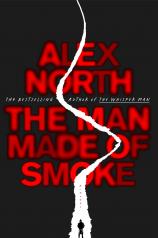Excerpt
Excerpt
The Man Made of Smoke

One
Richard Barber’s basement was cold and dimly lit. The redbrick walls were lined with old cobwebs, the air was filled with the slow, constant plink of dripping water from somewhere in the shadows, and rusty pipes ran down one wall from the ceiling to the floor. Between those pipes, set into the stone, was a wooden door with a metal handle.
He was staring at that now.
“I want you to know that you’re safe, Richard,” I said.
“I know.”
“Nothing here can harm you. It’s all in the past.”
“I know,” he said. “I trust you.”
Richard was one of my patients. An average man in many ways, the type you would walk past on the street without giving a second glance to. The two of us were in the room at the hospital that I used for my one-to-one therapy sessions. Budgets were tight, but I had done my best to make this particular room as reassuring as possible. The walls were painted a calming shade of blue. The carpet was softer than the ones out in the halls. Years earlier, I had struggled into work with a plant pot balanced under each arm. Those now rested in the corners of the room, the plants having grown in the time since until they almost reached the ceiling.
There were two leather chairs, both of which reclined. As usual, I was sitting upright, with my notes on a clipboard on my knee, and Richard was practically horizontal. He was in a hypnogogic state right now, halfway between sleep and waking, with his eyes closed and his hands resting protectively over his stomach. It was important for him to be as relaxed as possible. Because whatever I’d achieved with the real life surroundings, I knew the room he was seeing in his mind right now was far from comfortable.
At the beginning of our therapy, I had asked him to imagine his mind was a house. In the months since, we had walked through many of its rooms together, discussing the memories he found there.
I was conscious that he would only open the easy doors at first: the ones that led into rooms that felt safe for him to be in, and to show to a guest. But like most people, Richard had much darker memories: ones his mind kept locked away out of sight. As we gradually established trust over time, he had allowed me deeper into his house, into rooms filled with abuse and trauma.
And finally, today, all the way down to the basement.
“Can you picture the door?” I said.
He nodded.
I glanced at the clock on the wall, the second hand moving silently. There were only ten minutes of our scheduled hour left, which left me with a dilemma: push forward or pull back? It had taken eight careful months to bring us this far, and if it took the same again for a breakthrough then that was fine. We both had all the time in the world.
But I wanted to know what was on the other side of the door.
“I’d like you to take hold of the handle,” I said. “Do you think that you can do that, Richard?”
“Yes.”
“How does it feel?”
“Scary.” He grimaced, his eyes still closed. “Sharp.”
“I know. You don’t have to turn it if you don’t want to.”
“But it’s safe?”
“Yes,” I said. “There’s nothing in there that can hurt you anymore.”
“It feels like there is.”
“Because it’s like a splinter underneath your skin,” I said. “Eventually you get so used to it that you forget that it shouldn’t hurt. And even if removing the splinter is painful at the time, it might help eventually. It’s the only way to heal.”
I set the hypocrisy I felt to one side. This wasn’t about my own splinters or doors. I had to concentrate on my patient, especially given what might happen next. The things Richard had already described to me were terrible enough. It was difficult to imagine how much worse the deeply buried memory waiting for him here might be.
“I understand,” he said. “I’m turning the handle now.”
“That’s good, Richard. I’m here.”
A few seconds of silence. Then he frowned.
I said, “Where are you, Richard?”
“I’m on a pier.”
“At the seaside somewhere?”
He nodded slowly, but he was still frowning to himself, as though he couldn’t make sense of what he was seeing. Whatever it was, it didn’t appear to be obviously traumatic, and that seemed to have taken him aback a little.
“I’m on the promenade,” he said. “I think that’s what it’s called. It’s wooden, anyway. There are amusement arcades on the other side of the road. And on this one, there’s some bollards. There’s steps down to the beach and the sea.”
Knowing his history, I considered my next question carefully.
“Are you on holiday with your family?”
“No,” he said. “Just my mother.”
I made a note in my file. As a child, Richard had been the victim of violence at the hands of various men who had drifted in and out of his mother’s life. As far as I knew, she herself had never hurt him. It was interesting to me that, even after everything he’d been through, he still thought of family as requiring one of those abusive men to be present.
“Can you see anything else?” I said.
His demeanor changed suddenly. His face contorted.
“It’s the ice-cream van,” he said.
“Nothing here can hurt you, Richard.”
“I’m not scared of it.” He shook his head. “It makes me angry.”
I looked down at his hands. His fists were clenched now.
Copyright © 2025 by Alex North



